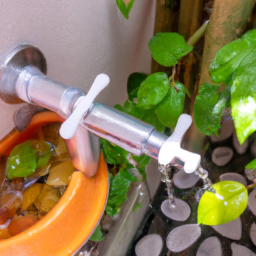How To Use Kitchen Waste Water For Gardening
Table of Contents []
How To Use Kitchen Waste Water For Gardening
Introduction
Using wastewater from kitchen sinks and dishwashing pools for gardening has been a popular practice among urban gardens for a while now. As the need for environmental sustainability rises, more households are attempting to find sustainable and affordable alternatives to the use of traditional water sources. There are various methods and approaches to utilize this wastewater for gardening and this guide will explore the 8-12 topics you need to know about using kitchen wastewater for gardening.
Wastewater Management
Wastewater management is a key factor when utilizing greywater from the kitchen. This type of wastewater can be reused an unlimited amount of times for gardening and can be easily recycled. A home-based filtration system or greywater reuse system should be set up to properly treat wastewater and convert it into usable water for gardening. Proper management of wastewater is essential to protect the environment and to successfully use kitchen wastewater for gardening.
Plant Selection
The plant selection plays a major role in determining the success of using kitchen wastewater for gardening. The type of plant being grown will determine the nutrient requirements and the specific irrigation needs for the selected plants. If the wrong type of plant is selected, the garden's health and growth will be impaired as a result. Due to this, it is important to select the right plants for a successful experience.
Water Compounding
Due to the high levels of nutrients in greywater from the kitchen, it is very beneficial to water compounding where water is combined with wastewater. Water compounding is done by combining water from a conventional water source and the greywater from the kitchen in order to reduce the nutrient levels in the wastewater. The reduction of nutrient levels will lessen the chances of plant diseases and create a better balance of nutrients for the plants.
Drainage
Due to the high levels of nutrients in wastewater, appropriate drainage systems should be put in place for efficient drainage of wastewater. The type of drainage system required depends on the size of the garden and the amount of wastewater that will be used. There are various options such as tanks, pond-like systems, drainage ditches, and catchment systems that can be used to ensure an effective drainage system.
Composting
Composting is a great way to make use of kitchen wastewater. Depending on the type of composting system used and the nature of the kitchen waste, composting can be used to create compost as a form of mulch for plants. This will lessen the amount of kitchen wastewater used and ensure that only high-quality compost is used for plants, which increases their health.
Fertilizers
Fertilizers play a key part in the health of the garden and the plants in it. The use of organic fertilizers such as compost or seaweed extract is recommended to ensure the best results for the garden. The use of synthetic fertilizers is not recommended due to their high salt content, which can be potentially damaging to plants.
Chemical Content
The chemical content of greywater from kitchen sinks and dishwashing pools can vary significantly and needs to be monitored. To ensure that the greywater used is suitable for gardening, laboratory testing or a simple home-based testing kit can be used to identify the chemical content of wastewater.
Irrigation System
Appropriate irrigation systems should be put in place in order to ensure the efficient use of kitchen wastewater. There are various types of irrigation systems that can be used, such as drip irrigation, bubbler irrigation, and trickle irrigation, which can be chosen based on the size of the garden, availability of the wastewater, and the budget available.
Bacteria
Bacterial growth is a key factor to consider when utilizing kitchen wastewater for gardening. To reduce the chances of bacterial growth in the garden, additives such as chlorine or hydrogen peroxide can be used to ensure that the greywater is safe to use for gardening.
Summary
Using kitchen wastewater for gardening has multiple benefits and is a great way to reduce the household's water usage. However, it is important to properly manage the wastewater, select suitable plants, and implement the right irrigation system in order to get the best results. This guide has explored 8-12 topics you need to know in order to successfully use kitchen wastewater for gardening.

Previous Page
Next Page
